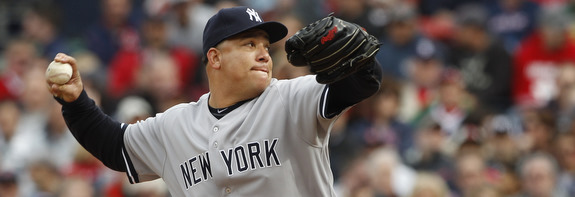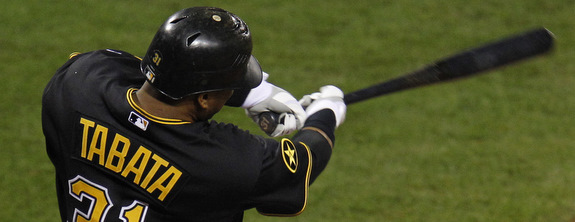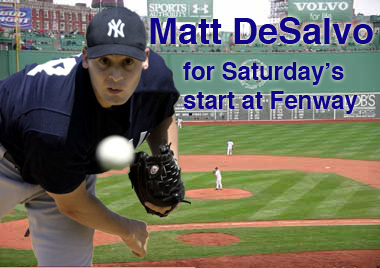I’ve got five questions for you this week, each bringing something unique to the table. The Submit A Tip box in the sidebar is the way to go if you want to send in questions.

Findley asks: What are the chances that Bartolo Colon makes a start for the Yankees this season? And how would he fare?
I will say small, maybe 10% or so. The Yankees seem to like him in that Al Aceves role (even though we’ve only seen him in long relief so far), the versatile bullpen guy that could give you three outs or three innings. We also have to remember that his velocity has declined steadily during his outings (here’s his velo graph from game one, game two, and game three), maybe from lack of conditioning/fatigue, maybe from being physically unable to hold that velocity over 80-100 pitches. The guy had some major shoulder problems, you know.
I suspect that if he did start, Colon would be average at best. Six innings and three or four runs seems like a reasonable best case scenario, and finding a guy to do that shouldn’t be too hard. I wanted Colon to start the season in the rotation and think he should be there, but that’s only because I think he’s better than Freddy Garcia.
David asks: It seems like so called “toolsy” guys are a dime-a-dozen in the minor leagues. Athletic shortstops who have a great glove but nobody is real sure if the bat is ever going to show up. Obviously some of these guys even make it to the bigs (like Nunez/Pena). So, is it safe to say that predicting what a guy is going to be able to do in the field is a helluva lot easier than predicting his hitting ability? IE if you see a slick fielding high school guy, is it a much smaller leap to assume that guy will be able to do the same things in the big leagues? By comparison, some guy who can hit home runs off HS pitching (or hit for average for that matter) seems like much more of a crap shoot to project (hell, I even hit a few dingers in my day).
Hitting a round ball with a round bat is the hardest thing to the do in sports, so yeah, projecting offensive ability is tough that projecting defense. That doesn’t mean it’s a slam dunk though. Players get bigger and might have change positions, which has a big impact on their future defensive value. The professional game is faster than anything these guys saw in high school and in college, so routine grounders aren’t so routine anymore. That said, the athleticism and reflexes needed for fielding a little more obvious than those needed for hitting. When it comes to batting, you’re talking about guys seeing breaking balls for the first time, getting pitched inside for the first time, using wood bats for the first time, etc. There’s a lot that can do wrong there.
But then again, I’m no expert, so I wouldn’t take my word as gospel. It just seems like projecting defensive ability would be a helluva lot easier than projecting whether or not a guy could hit Major League caliber pitching.
Charles asks: Is it possible for a team to exercise future club options early? For instance, is it possible to exercise Buchholz’s club options now, then trade him to another team if they could receive a good deal in exchange? Strictly hypothetical, not logical.
Just about all of these options have windows during which they must be exercised/declined, and that’s usually within ten days after the end of the World Series. Sometimes the contract will stipulate that the team has to decide on an option a year ahead of time, like the Blue Jays had to do with Aaron Hill’s 2012, 2013, and 2014 options this year. They had to either a) pick up all three before the start of this season, or b) forfeit the 2014 option all together. They passed this time around, but can still exercise the 2012 and 2013 options after this season.
Sometimes there’s no window and it’s anytime before the player becomes a free agent. I know the Phillies picked up Jimmy Rollins’ option a full year before they had to. Frankly, I think Buchholz would have more value without the options picked up in your hypothetical scenario. Instead of trying to trade a 26-year-old with five years and $30M coming to him with two club options, they’d be trying to trade a 26-year-old with seven years and $56M coming to him. I’d rather not have the options picked up and keep the flexibility.

Brian asks: So apparently the Pittsburgh Post-Gazette is already calling the Pirates the winners of the Nady/Marte trade of a couple years ago. Is it still too early to tell who won? Granted Nady is gone and Marte likely wont pitch again this year, but Tabata has only played MLB level ball for a couple weeks now. And we did get that magical post-season out of Marte in 2009.
I think the Pirates won this trade rather convincingly. Xavier Nady predictably turned back into a pumpkin after the trade, and then he missed basically all of 2009 with the elbow injury. Damaso Marte’s been a complete non-factor for New York outside of two weeks in October and November of 2009. If you want to fWAR this, the Yankees acquired exactly one win the trade.
As for Pittsburgh, they’ve already gotten two okay (1.1 and 0.9 fWAR) seasons (285 IP total) out of Ross Ohlendorf, not to mention a pair of up-and-down arms (393.1 IP combined) in Jeff Karstens (0.8 fWAR) and Dan McCutchen (-0.7 fWAR). Jose Tabata’s the real prize as a legitimate everyday outfielder. He’s not (yet?) the star we thought he’d become and probably won’t ever turn into that guy since he’s a corner outfielder with little power, but he can hit (career .336 wOBA) and is dirt cheap for the foreseeable future. He’s already been worth 2.7 fWAR by himself, and has a good chance of being a four win player this season.
The Yankees probably don’t win the 2009 World Series without Marte’s great relief work, so in that respect they “won” the trade. But in terms of value added and subtracted, the Pirates kicked their asses, even if none of three pitchers turns into anything better than what they are right now.
Tucker asks: Who would you say has been the most productive big leaguer out of the old big three (Joba, Hughes, Kennedy)? I’m leaning Kennedy but Hughes is right there.
I think it’s Joba Chamberlain and not particularly close. Let’s look at their big league resumes in general terms…
Joba: one full season as a starter (2009), one full season as a reliever (2010), one full season as a reliever/starter (2008)
Hughes: one full season as a starter (2010), one full season as a reliever (2009), one half season as a starter (2007 and 2008 combined)
Kennedy: one full season as a starter (2010), one half season as a starter (2007 through 2009 combined)
Hughes has a leg up on Kennedy because of his relief stint in 2009, and Joba has a leg up on Hughes because of the 2008 season he split between the rotation and bullpen. If you want to get technical and compare fWAR, then Joba (7.5) leads Hughes (6.0) by a sizable margin and IPK (3.0) by a mile.
Who would I want long-term? I’d take Joba if I could move him back into the rotation. If not, then give me Kennedy. Phil’s missing velocity and stuff this year raises a pretty big red flag. Four months ago I would have said Hughes without thinking twice about it. Funny how that works.
 Julio Lugo’s first-pitch comebacker off of Jeff Karstens’s leg end up
Julio Lugo’s first-pitch comebacker off of Jeff Karstens’s leg end up 